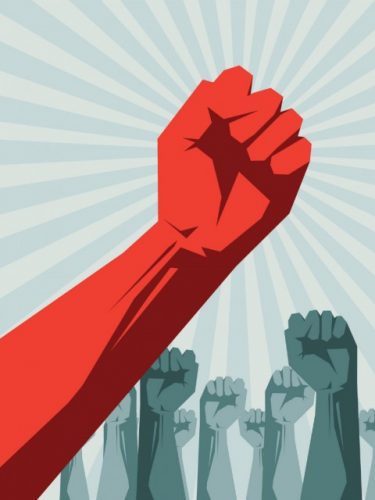Earlier this week, I wrote a post on Marx and the ‘rights of man.’ I want to continue the theme by applying it to free speech and the left. Free speech is kind of a hot topic on the left. Some leftists come out pretty hard against something they call free speech. Other leftists, like Noam Chomsky, defend it (they mean something a bit different, as we’ll see).
Part of what makes this issue difficult is that the U.S. far-right poisons the well. It shrouds itself in the language of ‘free speech,’ but it does so dishonestly. It pretends to be persecuted. And we do find some hard anti-speech attitudes within certain ‘left’ identitarian movements. But these elements hold little real power. The left shouldn’t cede the ‘free speech’ label to the political right because of this.
How should we think about it, then?
Thinking Strategically About Free Speech
Nathan J. Robinson published an article awhile back in Current Affairs on…well…thinking strategically about free speech. And violence. He wrote the article in the context of Antifa action and the de-platforming of far right-wing speakers on college campuses. I’ll mostly set aside the topic of Antifa, since I’ve written previously on this.
Robinson focuses mostly on issues of the consequences of our actions as leftists. Ultimately, I think he’s writing more about pragmatics or just straight-up consequentialism than about strategy. But I won’t pick too many nits there. He does a nice job distinguishing between the short-term and long-term consequences.
I like that Robinson focuses his thoughts around what we’re doing as leftists. It’s not really our job to defend or oppose the principles of bourgeois government. Our goal is socialism – democratic and liberatory forms of economic control and ownership. As for specific principles of government, our question is whether those help us reach socialism or not. By contrast, our question isn’t whether they’re in the constitution or fit some US-centric notion of ‘liberty,’ and so on. Those aren’t leftist concerns.
Free Speech and Free Expression
As the U.S. constitution lays it out, free speech is about a relationship between people and the government. It implements – as Marx points out – freedom from the state. Many leftists – even Robinson – often forget this. It doesn’t free anyone from private criticism, even violent private criticism. If Antifa de-platforms someone, or if Facebook takes down a page, etc., there’s no speech violation here. Why? Because neither Antifa nor Facebook is a government. De-platforming someone violently might violate the law. It might be a crime. But if so, the crime is assault and battery, not ‘violation of free speech.’
And so, de-platforming someone doesn’t violate their free speech. At least as long as the state isn’t doing the de-platforming, Rather, it’s about broader issues of free expression in society. Some philosophers – notably Mill – argue that protections of speech should extend beyond merely being a constitutionally protected right. They think members of society should openly cultivate values of tolerance and listening to others. Especially others with whom we disagree.
But the entire de-platforming dispute between Antifa and the far right mostly takes place in that realm. Not in the ‘free speech’ realm.
The Left and the ‘Rights of Man’
And so, we find ourselves back where we left off after the Marx post. What should we do as leftists?
First, we should support ‘free speech’ – in the sense of opposing government regulation of speech – as something pretty close to an absolute right as defended by organizations like the ACLU. This means that, yes, even neo-Nazi groups should have the right to march, publish, et al., without being shut down by the government.
Second, nothing about supporting free speech requires anyone on the left to personally respect the rights of far right groups to do any of those things. Supporting free speech doesn’t mean you can’t organize to shut down far right marches or meetings. Standard Antifa de-platforming tactics do not violate free speech. The question of whether we should de-platform anyone is a pragmatic question about our goals as leftists.
Third, in both of these cases, many issues reduce to pragmatic and strategic questions. And it’s through considering them in this way that I come up with my answers here. Allowing the government to regulate speech is dangerous in any situation. And it almost always uses any powers in this area against the left, not against the right. Opposing free speech always increases the chances the government will regulate leftist speech.
And, finally, I think this settles an underlying tension in the Marxist attitude toward these issues. It settles how we can both point out that these rights are in many ways rigged against us, but also recognize that they are rights we need to preserve in order to build strong movements.
